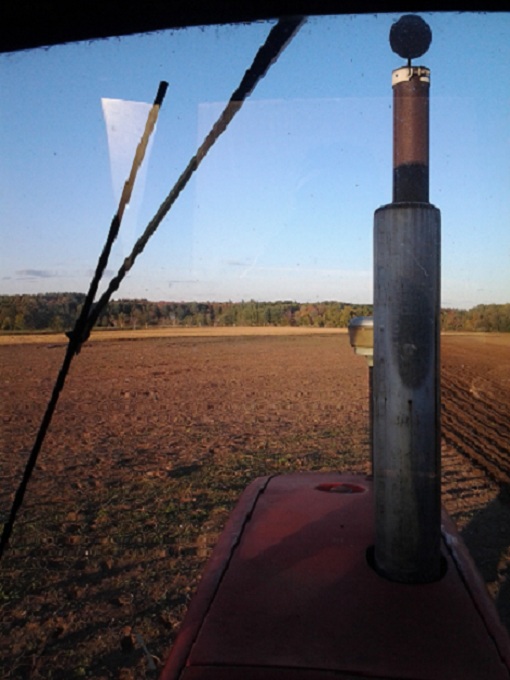Have
you priced lumber lately? The price of lumber futures on the Chicago
Mercantile Exchange recently surged above $1,500 per thousand board
feet. That’s a 300% rise from this time last year.
2x4s are
suddenly very, very expensive and so are things made with the softwoods.
The cost of building a new home, for example, is up by about $36,000 on
average. What’s going on?
That question led me to Bob Bauer, Executive Director of the Kentucky Forest Industries Association.
Our conversation has been edited for clarity and length. You can listen
to the interview on the May 20 edition of Eastern Standard, 11 a.m. and
8 p.m. on 88.9 WEKU.
Martin: What sectors of the forestry industry do you represent?
Bauer:
Our association represents a wide range of the industry mostly
dominated by hardwood sawmills. Of course, we represent the loggers out
there in the woods and also a lot of the secondary people that produce
things like hardwood flooring and in the paper industry.
Martin:
Going into the pandemic last year, was there an expectation that
COVID-19 would lead to an industry-wide slowdown instead of the
industry-wide boom that has actually happened?
Bauer: Yes,
as far as the hardwood industry, actually there was a lot of
anticipation that the markets were going to get better. In early March
of last year, they finally worked out agreements as far as export
markets, which has a big impact on the hardwood industry - a lot of the
higher grades of lumber are exported.
That was decided in early
March, so there was an expectation that things were going to get better.
But, when the pandemic hit, we actually had things fall off
considerably. Then the market started to recover a lot faster than
people thought.
Martin: Your members deal mostly in hardwoods, the woods used for flooring, cabinetry, doors, items inside the home, correct?
Bauer:
Yes. We’re dominated by hardwood because that’s what’s in our forests
here. Our members that produce all types of things that are in the home:
the flooring, doors, millwork, the cabinets, furniture. And our
industries heavily produce a lot of palettes, cross ties for the
railroad industry and those types of things, which the lower quality
wood goes into.
Martin: Are these price spikes and the supply situation limited to softwoods or have they impacted hardwoods as well?
Bauer:
We’ve seen an impact in the hardwoods. The pandemic did cause a
slowdown. It was harder for everybody to work. Luckily the hardwood
forestry business was declared an essential industry, so they were able
to work and operate throughout the pandemic. Part of our industry is the
paper industry and you know how important all of that is, the
packaging, toilet paper.
And we did see quite a slowdown through
probably the first four to six months. But as last summer ended the
market started to improve some in the hardwood business and they’ve
continued and now the markets are pretty strong - better than they were
last March for sure.
Martin: Does that translate all the way down the supply chain line to paper products? Can we expect price increases on that end?
Bauer:
Here in Kentucky, our paper industry is tied closer to fine paper which
would be office paper, that type of thing. We lost a large paper mill
down in Tennessee because of the demand for office paper, those kind of
things, which has had a ripple effect on our industry because all of
these hardwood sawmills, anything that they don’t use in the lumber is
chipped into chips that then go to the paper industry. So, we did see an
effect where it made it a little tougher to get rid of those – those
things from the hardwood sawmills.
Martin: Let’s turn to to
the softwoods. This is the lumber used in construction to make things
like palettes and fence posts, not to mention in homes. What is
happening on the softwood side?
Bauer: The softwood side
obviously was affected too going into the pandemic. Obviously, there was
a huge concern just like every other industry. So, as that started our
industry cut way back with the assumption that the markets were going to
slow. And for a brief period of time they saw that just because
everybody was held at home.
But, as time went on, people had time
on their hands, so they started doing more home improvement, adding on a
garage or whatever. The softwoods go into that construction: lumber,
plywood, all those things that are used in the structural parts of
building. So, that market quickly stayed the same or improved. And with
the demand increasing, those large mills tried to start ramping up. Of
course, they had the pandemic to deal with so it’s basically put them
behind the eight ball and they’re still struggling. And one difference
between the hardwood and the softwood business is in the the way those
hardwood logs are sawn. There’s much smaller volume at hardwood
sawmills. An average size hardwood sawmill may produce 10 million board
feet a year, whereas some of the (softwood) mills in the south produce
300 to 400 million a year.
One of those mills closing down, you
can see how that would quickly affect the supply. So, that demand, came
back quickly and they’ve struggled to catch up. And on top of that, the
housing markets are very much improved and we’re seeing that on the
upswing the last number of months, so that’s also created even more
demand.
Boy, it’s really been a tough time trying to get back up to that level of production to meet all the needs out there.
Martin:
What about over on the labor side of the equation as they have tried to
rebuild capacity and get back up to a point where they can meet that
demand? Have they been able to find employees to come in and make it
happen?
Bauer: That’s a huge issue. With the pandemic there
were things they had to do to keep people protected, which they
continue to do, but that has made it very difficult to get people back
online. I’ve been out in the last month visiting a number of mills and
nearly every place I go they’re looking for employees and can’t find
them. Without enough people, they can’t ramp up production.
There
are a number of things driving that. The number one thing that I hear,
especially out in the rural areas of the state and from my counterparts
in the south is with all of the packages that have been put together,
the high amount of money that’s going into unemployment, they simply
can’t compete with somebody that can sit at home and make that kind of
money instead of working. So, that’s become a real issue out there for
the industry.
Martin: Lumber industry analysts say that
$1,500 per thousand board feet of softwood that I mentioned earlier is,
of course, not sustainable. But, the pre-COVID price of $300 to $500 may
never come back and instead we might get stuck in a higher range, maybe
$800 to $1,000. Do you agree with that assessment?
Bauer:
Well, it’s hard to say. It’s a great question. What I’ve seen especially
related to the hardwood industry over the years is that eventually that
supply reaches back to where it meets the demand. I guess I wouldn’t be
surprised that maybe it’s a little higher. I think we’ll see the upper
range in the $500 or $600 area. But, I think as you see production
increase – and we’ve already seen some newer mills coming online and
people increasing production — that will stabilize that back. I don’t
think we’ll see a huge change in that obviously.









 Topic Options
Topic Options


 Post Options
Post Options Thanks(0)
Thanks(0)




 Tbone95 wrote:
Tbone95 wrote:
 . The suppliers have them, just that they're not letting loose of the product
. The suppliers have them, just that they're not letting loose of the product  This is from lumber,paint, window/door and drywall compound users
This is from lumber,paint, window/door and drywall compound users 
